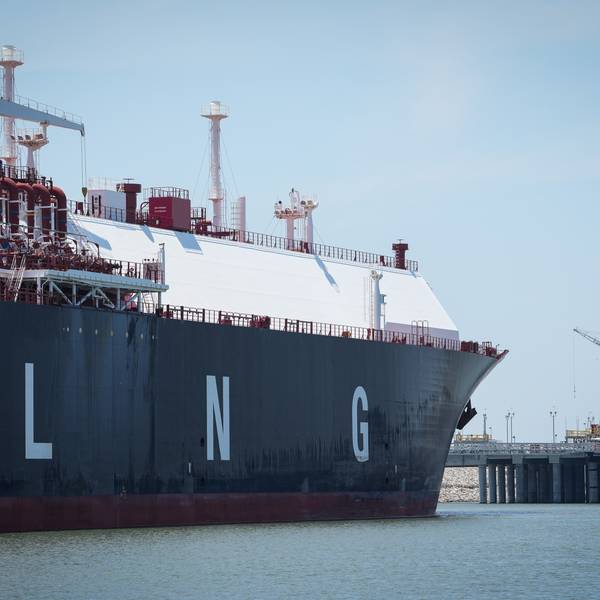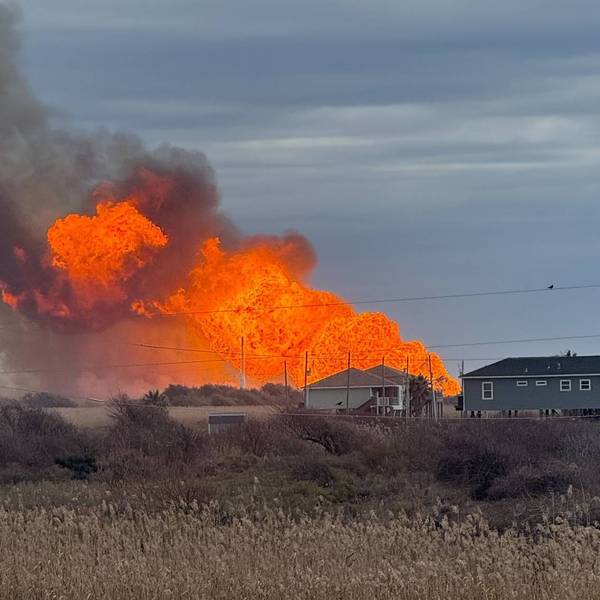Scientists Say Canada's Proposed LNG Port Threatens Paris Climate Accord
The British Columbia project 'will emit at least 11.5 million tonnes of CO2 per year, not including downstream emissions when the gas is burned in Asia'
Ninety climate change experts from around the world urged Canadian government officials to "take urgent action" and reject a proposed, "unjustified" liquid natural gas (LNG) export terminal to be built on the British Columbia coast, joining with fierce local Indigenous opposition to the controversial project.
"The carbon emissions of the proposed PNW LNG terminal and associated upstream natural gas development would be 'high in magnitude, continuous, irreversible and global in extent.'"
In an open letter (pdf) dated Thursday, the scientists warned "that the B.C. project would belch out emissions rivaling a large plant in Alberta'soil sands," the Globe and Mail reported Monday.
The export terminal, known as the Pacific Northwest LNG (PNW LNG) project, "poses serious risks" to the Canada's climate change commitments--particularly those made at last year's Paris accord, the scientists argue:
The challenges to BC and Canada's efforts to reduce GHG emissions will be exacerbated because of two issues: 1) the international agreement on climate change reached in Paris will require Canada to increase its ambition to reduce GHG emissions over time (and this requirement is embedded within the Vancouver Declaration signed by the Prime Minister and the premiers on March 3); and 2) the methane emissions from upstream gas included in the draft Environmental Assessment report likely underestimate the true contribution of emissions from the project.
Point by point, the letter writers critique proponents' arguments in favor of the PNW LNG project. The experts note that:
- GHG emissions from the project are likely underestimated.
- There is inadequate climate policy to reduce impacts for the project.
- There is no evidence that LNG from the project will replace coal in Asia.
On this last point, the scientists also note that "LNG will also likely displace nuclear power, renewables, and natural gas from other sources in many importing countries. There are many locations where LNG consumption would be additional to coal consumption, instead of replacing it. Importantly, GHG emissions from fracking, transport, liquefaction, and regasification significantly reduce LNG's GHG benefits over coal."
Moreover, the letter continues:
The Canadian Environmental Assessment Agency has found that the carbon emissions of the proposed PNW LNG terminal and associated upstream natural gas development would be "high in magnitude, continuous, irreversible and global in extent." Their research finds the project will emit at least 11.5 million tonnes of CO2 per year, not including downstream emissions when the gas is burned in Asia.
Finally, the scientists put forth an argument seemingly applicable to many fossil fuel projects being debated in North America today:
"Honoring the commitment Canada made in Paris to limit global warming to well below 2.0 degrees above pre-industrial levels will require a massive effort to reduce emissions," the letter concludes. "We must begin by rejecting plans that would increase GHG emissions and lock us in fossil fuel extraction for decades to come."
An Urgent Message From Our Co-Founder
Dear Common Dreams reader, The U.S. is on a fast track to authoritarianism like nothing I've ever seen. Meanwhile, corporate news outlets are utterly capitulating to Trump, twisting their coverage to avoid drawing his ire while lining up to stuff cash in his pockets. That's why I believe that Common Dreams is doing the best and most consequential reporting that we've ever done. Our small but mighty team is a progressive reporting powerhouse, covering the news every day that the corporate media never will. Our mission has always been simple: To inform. To inspire. And to ignite change for the common good. Now here's the key piece that I want all our readers to understand: None of this would be possible without your financial support. That's not just some fundraising cliche. It's the absolute and literal truth. We don't accept corporate advertising and never will. We don't have a paywall because we don't think people should be blocked from critical news based on their ability to pay. Everything we do is funded by the donations of readers like you. Will you donate now to help power the nonprofit, independent reporting of Common Dreams? Thank you for being a vital member of our community. Together, we can keep independent journalism alive when it’s needed most. - Craig Brown, Co-founder |
Ninety climate change experts from around the world urged Canadian government officials to "take urgent action" and reject a proposed, "unjustified" liquid natural gas (LNG) export terminal to be built on the British Columbia coast, joining with fierce local Indigenous opposition to the controversial project.
"The carbon emissions of the proposed PNW LNG terminal and associated upstream natural gas development would be 'high in magnitude, continuous, irreversible and global in extent.'"
In an open letter (pdf) dated Thursday, the scientists warned "that the B.C. project would belch out emissions rivaling a large plant in Alberta'soil sands," the Globe and Mail reported Monday.
The export terminal, known as the Pacific Northwest LNG (PNW LNG) project, "poses serious risks" to the Canada's climate change commitments--particularly those made at last year's Paris accord, the scientists argue:
The challenges to BC and Canada's efforts to reduce GHG emissions will be exacerbated because of two issues: 1) the international agreement on climate change reached in Paris will require Canada to increase its ambition to reduce GHG emissions over time (and this requirement is embedded within the Vancouver Declaration signed by the Prime Minister and the premiers on March 3); and 2) the methane emissions from upstream gas included in the draft Environmental Assessment report likely underestimate the true contribution of emissions from the project.
Point by point, the letter writers critique proponents' arguments in favor of the PNW LNG project. The experts note that:
- GHG emissions from the project are likely underestimated.
- There is inadequate climate policy to reduce impacts for the project.
- There is no evidence that LNG from the project will replace coal in Asia.
On this last point, the scientists also note that "LNG will also likely displace nuclear power, renewables, and natural gas from other sources in many importing countries. There are many locations where LNG consumption would be additional to coal consumption, instead of replacing it. Importantly, GHG emissions from fracking, transport, liquefaction, and regasification significantly reduce LNG's GHG benefits over coal."
Moreover, the letter continues:
The Canadian Environmental Assessment Agency has found that the carbon emissions of the proposed PNW LNG terminal and associated upstream natural gas development would be "high in magnitude, continuous, irreversible and global in extent." Their research finds the project will emit at least 11.5 million tonnes of CO2 per year, not including downstream emissions when the gas is burned in Asia.
Finally, the scientists put forth an argument seemingly applicable to many fossil fuel projects being debated in North America today:
"Honoring the commitment Canada made in Paris to limit global warming to well below 2.0 degrees above pre-industrial levels will require a massive effort to reduce emissions," the letter concludes. "We must begin by rejecting plans that would increase GHG emissions and lock us in fossil fuel extraction for decades to come."
Ninety climate change experts from around the world urged Canadian government officials to "take urgent action" and reject a proposed, "unjustified" liquid natural gas (LNG) export terminal to be built on the British Columbia coast, joining with fierce local Indigenous opposition to the controversial project.
"The carbon emissions of the proposed PNW LNG terminal and associated upstream natural gas development would be 'high in magnitude, continuous, irreversible and global in extent.'"
In an open letter (pdf) dated Thursday, the scientists warned "that the B.C. project would belch out emissions rivaling a large plant in Alberta'soil sands," the Globe and Mail reported Monday.
The export terminal, known as the Pacific Northwest LNG (PNW LNG) project, "poses serious risks" to the Canada's climate change commitments--particularly those made at last year's Paris accord, the scientists argue:
The challenges to BC and Canada's efforts to reduce GHG emissions will be exacerbated because of two issues: 1) the international agreement on climate change reached in Paris will require Canada to increase its ambition to reduce GHG emissions over time (and this requirement is embedded within the Vancouver Declaration signed by the Prime Minister and the premiers on March 3); and 2) the methane emissions from upstream gas included in the draft Environmental Assessment report likely underestimate the true contribution of emissions from the project.
Point by point, the letter writers critique proponents' arguments in favor of the PNW LNG project. The experts note that:
- GHG emissions from the project are likely underestimated.
- There is inadequate climate policy to reduce impacts for the project.
- There is no evidence that LNG from the project will replace coal in Asia.
On this last point, the scientists also note that "LNG will also likely displace nuclear power, renewables, and natural gas from other sources in many importing countries. There are many locations where LNG consumption would be additional to coal consumption, instead of replacing it. Importantly, GHG emissions from fracking, transport, liquefaction, and regasification significantly reduce LNG's GHG benefits over coal."
Moreover, the letter continues:
The Canadian Environmental Assessment Agency has found that the carbon emissions of the proposed PNW LNG terminal and associated upstream natural gas development would be "high in magnitude, continuous, irreversible and global in extent." Their research finds the project will emit at least 11.5 million tonnes of CO2 per year, not including downstream emissions when the gas is burned in Asia.
Finally, the scientists put forth an argument seemingly applicable to many fossil fuel projects being debated in North America today:
"Honoring the commitment Canada made in Paris to limit global warming to well below 2.0 degrees above pre-industrial levels will require a massive effort to reduce emissions," the letter concludes. "We must begin by rejecting plans that would increase GHG emissions and lock us in fossil fuel extraction for decades to come."

